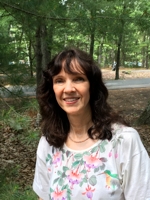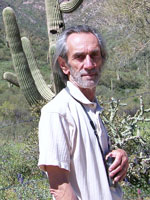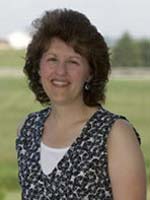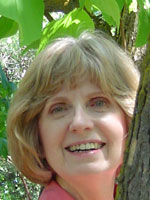Issue Number 9, Summer 2010
Contents
- This Compost by Walt Whitman
- Avon Calling in the Amazon by Lucille Lang Day
- Changing Tense by David Chorlton
- Garden Verse by Barbara Joan Tiger Bass
- Happiness by Ann Fisher-Wirth
- Nest by Judy Bebelaar
- Out Here by Julie L. Moore
- Polar Bear, (Ursus maritimus) by Amanda Sandos
- Soldiers' Stories by Eugenia Hepworth Petty
- The Holiness of Potatoes by Dianna Henning
- The Skin by James Downs
- Threshold by Irene Hays
Archives: by Issue | by Author Name

This Compost
by Walt Whitman
(1819-1892)

1
Something startles me where I thought I was safest,
I withdraw from the still woods I loved,
I will not go now on the pastures to walk,
I will not strip the clothes from my body to meet my lover the sea,
I will not touch my flesh to the earth as to other flesh to renew me.
O how can it be that the ground itself does not sicken?
How can you be alive you growths of spring?
How can you furnish health you blood of herbs, roots, orchards,
grain?
Are they not continually putting distemper’d corpses within you?
Is not every continent work’d over and over with sour dead?
Where have you disposed of their carcasses?
Those drunkards and gluttons of so many generations?
Where have you drawn off all the foul liquid and meat?
I do not see any of it upon you to-day, or perhaps I am deceiv’d,
I will run a furrow with my plough, I will press my spade through
the sod and turn it up underneath,
I am sure I shall expose some of the foul meat.
2
Behold this compost! behold it well!
Perhaps every mite has once form’d part of a sick person—yet behold!
The grass of spring covers the prairies,
The bean bursts noislessly through the mould in the garden,
The delicate spear of the onion pierces upward,
The apple-buds cluster together on the apple-branches,
The resurrection of the wheat appears with pale visage out of its graves,
The tinge awakes over the willow-tree and the mulberry-tree,
The he-birds carol mornings and evenings while the she-birds sit on their nests,
The young of poultry break through the hatch’d eggs,
The new-born of animals appear, the calf is dropt from the cow, the colt from the mare,
Out of its little hill faithfully rise the potato’s dark green leaves,
Out of its hill rises the yellow maize-stalk, the lilacs bloom in the door-yards,
The summer growth is innocent and disdainful above all those strata of sour dead.
What chemistry!
That the winds are really not infectious,
That this is no cheat, this transparent green-wash of the sea which is so amorous after me,
That it is safe to allow it to lick my naked body all over with its tongues,
That it will not endanger me with the fevers that have deposited themselves in it,
That all is clean forever and forever,
That the cool drink from the well tastes so good,
That blackberries are so flavorous and juicy,
That the fruits of the apple-orchard and the orange-orchard, that melons, grapes, peaches, plums, will
none of them poison me,
That when I recline on the grass I do not catch any disease,
Though probably every spear of grass rises out of what was once a catching disease.
Now I am terrified at the Earth, it is that calm and patient,
It grows such sweet things out of such corruptions,
It turns harmless and stainless on its axis, with such endless successions of diseas’d corpses,
It distils such exquisite winds out of such infused fetor,
It renews with such unwitting looks its prodigal, annual, sumptuous crops,
It gives such divine materials to men, and accepts such leavings from them at last.
© Walt Whitman

Avon Calling in the Amazon
by Lucille Lang Day
Lucy lives in the San Francisco Bay Delta Watershed, which covers more than 75,000 square miles. Her particular corner of this vast watershed is the watershed of Pleasant Valley Creek, which unfortunately now runs mostly under Grand Avenue in Oakland.

When the fog lifts, the river is full of tiny eyes
scanning the surface like submarine periscopes:
four-eyed fish seek floating insects.
Close-packed trees along the bank
silently compete for light. Lianas thick as wrists
run from canopy to ground and back again,
creeping everywhere, weaving the forest together.
Moths the size of human faces swoop in shadows,
but no howler monkeys call from tree to tree:
stillness permeates midday heat, except
for the put, put, put of the Avon lady's boat
with its cargo of Single Stroke
One Coat Nail Enamel, Pearls & Lace
Cologne Spray, Casbah Bath & Shower Gelée.
She has eaten so many Hershey bars
her two front teeth have decayed and fallen out.
She has washed her braids today
with Avon Plus Shampoo and splashed
bubble bath in the river. Her clients will give
chickens in exchange for SeaZone, the exhilarating
new fragrance with the power of the waves.
From Infinities (Cedar Hill), by Lucille Lang Day. First published in Blue Violin.
© Lucille Lang Day

Changing Tense
by David Chorlton
David lives close to the Sonoran Desert in central Phoenix in the Lower Salt Watershed, at an elevation of 1,124 feet with an average annual rainfall of 7.7 inches.

The present tense is threatened with extinction.
“I see a koala” could disappear from speech
in seven years according
to a Brisbane Times report. Speaking
will become an act of remembrance
says the BBC
citing references to the Iberian lynx
and none of the languages spoken in India
contain words to protect
the peacock from poaching
or pesticides. “The wings on that albatross
measure twelve feet across”
might be replaced by a question
or embellished by a gasp of wonder
at such a bird and turned
into a quote from a long dead sailor.
“What is a panda?” will be answered
with silence. Even some nouns
such as tusks and mane
will appear in sentences referring to the past.
This is happening in English,
Spanish, Chinese.
It is happening.
Soon we will say
“It was happening while we watched.”
© David Chorlton

Garden Verse
by Barbara Joan Tiger Bass
Barbara Joan lives near the Hayward fault line and the Sausal Creek Watershed in Oakland, California.

I learned rue from Frost and spent
part of each day doing so
fragrance of fresh earth
torn stalk of sage
I began to despair and then... kiwi
vines entwined above
a first word moon
emerged to applause
neurotransmitters traveled
at break-neck speed
how was stored
elsewhere
© Barbara Joan Tiger Bass

Happiness
by Ann Fisher-Wirth
Ann lives in the North Mississippi hill country, about sixty miles east of the Delta and the Mississippi River, in the Tallahatchie River watershed.

The walk that afternoon came to nothing
they could measure. At the end of the road,
a gnat-flecked lake. He descried a heron,
far among the trees, but though she tried
she could not see it. They walked back home,
past sumac crimson on bitten branches,
weather-scarred bottles junked in ditches.
That night she lay beneath him and he held her face,
caressed her jaw until she yawned
and yawned, body and soul released, at peace.
There would be a last time but this was not it, yet,
this dusty season of goldenrod and asters,
this hour in a high white bed.
Previously published in Valparaiso Poetry Review.
© Ann Fisher-Wirth

Nest
by Judy Bebelaar
Judy lives in the Derby Creek Watershed in Berkeley, California, between Derby Creek, which was long ago paved over, but still flows beneath the streets, and Claremont Creek, which runs down from the hills.

We haven’t figured out yet,
what kind of bird she is
small, a black spot on her head,
red-brown breast, gray wings.
We use the back door now
because every time we left by the front
she flew, a swift, frenetic flurry
heading to the tall birch across the street.
Today, in her nest in the hanging blue pot of ivy
on our front porch: four eggs, blue as a lost heaven.
Cats have not discovered her home,
artfully placed
but has she left the nest too often,
the eggs now cold and lifeless?
Why is this so important to me?
If her eggs become fledglings,
will it save the dolphins in Taiji Wakayama
being captured to sell to zoos
or slaughtered for fertilizer and pet food?
Save the polar bears, the rhinos, the penguins and the lynx,
the vultures and the monarch butterflies?
The sea turtles, the harp seals, the whales?
Will it spare the Saola, beautiful horned goat
with a painted face?
The Hmong call her the polite animal,
for the way she walks so gently
through the mountain forests,
unafraid of humans.
Today I heard on the radio
the story of a whale entrapped by fishing nets.
She remained very still, watching, while divers cut her free—
nudged each one
before she swam away.
Then I heard a woman tell about the time
she’d been kissed by a wild dolphin.
I remembered when my daughter
sat on the edge of the dolphin tank
and sent quiet thoughts into the water.
A dolphin came to her, as if he knew.
And on a breezy August day like this
it’s easy to believe, if just for a blue sky minute,
if I protect this single bird and her chicks,
the dolphins and whales,
the butterflies, the Saola—
all of them will survive.
© Judy Bebelaar

Out Here
by Julie L. Moore
Julie moved to Indiana four years ago and now enjoys long walks among the fields, foliage, and fowls along the Mississinewa River Watershed.

It’s possible to forget
out here, twenty miles from the base,
watching cinnamon-hued horses, smooth
as suede, grazing in their field,
foal at her mother’s teat,
brook noisy as a boy
sloshing in last night’s rainwater,
morning still steam-tinged—
when three F-16’s shoot by,
raking the landscape, pulling
up my eyes. And while the mare
simply bows, tugging
at a tuft of grass, my tongue
becomes dry as gauze,
tasting war
not so far away.
Previously published in the author’s book, Slipping Out of Bloom (WordTech Editions, 2010) & Greensilk Journal.
© Julie L. Moore

Polar Bear, (Ursus maritimus)
by Amanda Sandos
Amanda lives on a hundred-acre farm nestled between the Blue Ridge Mountains Peaks of Otter and the James River in the Blackwater Creek watershed.

Transparent hairs soak ultra violet
rays through hollow shafts, transferring
heat into a black hide for her insulation
against the frozen mass she floats on.
Trapped by melting tundra, she lies
conserving energy, growing thin, adrift
on this burg on the midnight sea, no prey
to hunt, no seals who once denned
under the ice.
Deep groans belch up from the belly
of the ice. She wakes with a shifting
tremble, stands to peer over the ledge
at wakes rippling out from her perch.
Her white reflection blurs. Another
shudder staggers her, and boulder-size
ice breaks free to slide down the wet
mountain towards her. She leaps
over building waves, plunges
into the sea.
Swimming hard toward a shelf
once only a mile from here, sluggish
limbs fight the churning surf. The ice
burg behind her splits, half its giant mass
plummeting, raising a cresting
tidal wave that rolls towards her, over her,
pulling her under, spinning her thousand-pound
body like a drift of powdery snow. She peddles
once-powerful legs, each swipe slower,
never finding the surface she seeks
until at last she rises and floats
face down.
© Amanda Sandos

Soldiers' Stories
by Eugenia Hepworth Petty
Eugenia lives in the Aptos Creek watershed, just a few minutes' walk up the hill from the creek and the Monterey Bay/Pacific Ocean into which it flows.

–Upon reading excerpts in Voices from Chernobyl
by Svetlana Alexievich
Arkadi told me how at seventeen, when he was a young conscript in the Soviet Army, he escaped a wild boar by climbing a tower of rock in the Afghan countryside. Three of his comrades huddled in a jeep, praying to no God in particular as they were Soviet boys; worshipers of the collective.
Only boys, truly, relegated to this war, then that disaster. After coming back from Afghanistan, Turganev was sent to Chernobyl—to wash the streets; overturn the gardens. He was there for six months. When he got home he threw all the clothes he’d worn there down the trash chute, except for his cap, which he gave to his little son, Vasil. Playing as a soldier, as a boy, Vasil wore that cap often. Two years later he had a tumor in his brain.
Who knew that death could be so beautiful? People poured onto balconies and stood in the black dust wondering at the ethereal fire that was a kind of shining.
The invisibility of it: until animals ran crazy in abandoned streets. The coxcombs of roosters turned from red to black. Milk curdled into powder.
In hospital number six, soldiers carried bedpans, wiped floors, changed bedding. The orderlies on staff refused. They demanded protective clothing. Where did they get those soldiers? We didn’t ask. Lyudmilla, a fireman’s wife recalls, tells of how she lifted her bandaged hands to her husband’s swollen mouth, removed pieces of his lungs, his liver, two days before he died, as he choked on his internal organs. Documents were signed by wives and mothers, surrendering the bodies of their loved ones to the State. They buried them in sealed zinc caskets, under cement tiles.
Arkadi ran his hand over a faded map, showing me the direction the wind took on that late day in April. When I made it back from Afghanistan, I knew I would live, he said. For those men it was the opposite: it killed them only after they got home
Note:
This poem was created by sandwiching the experiences of my friend Arkadi around the stories from Chernobyl survivors interviewed by Ms. Alexeivich.
© Eugenia Hepworth Petty

The Holiness of Potatoes
by Dianna Henning
Dianna lives in the Honey-Eagle Lakes Watershed, which is bordered by the Skedaddle Mountains. Because of California's drought, the Skedaddles are no longer mirrored in Honey Lake.

While I count my potatoes’ worth,
calculate how much they’ll yield the village,
they widen their space against silence.
Do they push with the walls of their skins
against the unknown? Do they peel back
their desires? Today, I grabbed a wheel-
barrow to cart them inside, bent at the tub,
rinsed their pretty heads, a scrub brush
in hand. When I wash something else,
do I also cleanse myself? Who flaunts
the fluency of growth, the way it conquers
and divides? I too have known moments
inside earth where each birth was promise
of something else. Didn’t I once sleep
as my potatoes slept, mute at the breast of depth?
There have been potatoes I’ve sometimes favored
more than people. Because of their faithful journey
in the dark, their absolute adherence to mystery.
Even the earth-worm knows the richness
of tubers cloaked in their drab burqas,
how all things wrap into something for comfort.
Originally published in the The Seattle Review, 2006
© Dianna Henning

The Skin
by James Downs
James lives on the western slope of the Sierra Nevada near the watershed of the Tuolumne River and along the watershed of The Merced River.

That thin sheath
between the interior of the body and the world
what we owe standing here bone
bleached by the sun
process that goes in and out the ear everything we hear
we grasp
the apple and bite down
hard indentations
clearly marked
puncture the curve of the earth with our love
© James Downs

Threshold
by Irene Hays
Irene lives in the semi-arid shrub steppe near the confluence of the Columbia and Yakima Rivers in southeastern Washington State.

What if we face the universe unbarred
no stories to make the strange familiar
no need to make a dog or a dipper of the stars
or explain the turn of the earth or a cloud gone dark
no old stories to deconstruct, say, religion or a tired metaphor?
What would it be like to live always at the threshold
of an ever generative universe
no fresher air at any glacier peak?
© Irene Hays